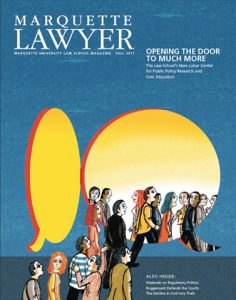Yes, the owners of the Milwaukee Bucks have big goals for their basketball team, including ultimately an NBA championship. But they also have big goals for spurring positive developments in Milwaukee, not only in the immediate area of their new arena downtown but more broadly.
“We’re trying to do our part as a good corporate citizen,” Alex Lasry, senior vice-president of the Bucks, said at an “On the Issues with Mike Gousha” program at Marquette Law School on Thursday.
Lasry, the son of Marc Lasry, one of the lead owners of the National Basketball Association franchise, emphasized the community involvement goals of the team. That starts with the arena and surrounding developments, including a practice facility, parking structure, and entertainment district. More development will come after the current arena, Bradley Center next door, is razed and land needed for construction purposes is freed up, Lasry said. He said the team was talking about $1 billion in total spending in the immediate area.
Public funding of the arena project, totaling more than $250 million in state and local money, is one reason the team is strongly committed to having a broader positive impact on Milwaukee, he said. But it goes beyond that.
Lasry said the chance to do more than just own a team was one of the big draws for his father and Wes Edens, the other major figure in the purchase of the team from Sen Herb Kohl in 2014.
“When my dad and Wes were buying the team, my dad had been looking to buy a team for about 10 years before he bought the Bucks,” Alex Lasry told Gousha. “He looked at the Sixers, he looked at the Hawks, he looked at a few teams, and was never quite able to pull the trigger on something.
“And I think when they came here, what they saw was not only a chance to own a basketball team, which had always been a life-long dream and has been really cool, but they saw a chance to re-think what a major part of a downtown could be. They saw a chance to actually develop 30 acres of a downtown in a major city, which I don’t know if a lot of you know, but you don’t actually get to do that in a lot of cities, where you kind of get a blank slate for 30 acres in a downtown.”
Describing the reach of what is going on in the immediate area of the arena, which is slated to open a year from now, Lasry said, “What we’re doing right there is exactly what we wanted to do and exactly what we promised, which is create real economic development and not just create an arena on an island, which is kind of what the Bradley Center is right now.”
The team’s community goals also include paying comparatively high wages for all the jobs connected to games; setting – and meeting – ambitious goals for hiring city residents and contracting with businesses owned by minority members and women during construction and beyond; and supporting economic development and community causes such as working with schools and youth organizations. He said the team wants its impact to reach beyond the arena area into neighborhoods across the city.
Lasry, who owns a home in Milwaukee and who has become involved in a list of civic groups, spoke highly of the city. Milwaukee has needs, he said, but the city has “incredible bones,” including a beautiful location and major universities. And then there are the people. “If you give Milwaukee 100 percent, Milwaukee will turn around and give you 200 percent,” he said.
”There is no reason it (Milwaukee) shouldn’t be able to match any big city,” he said. And the Bucks want to be a key part of that.
To watch the one-hour program, click here.
 The illustration on the cover of the new Marquette Lawyer magazine shows people entering a large door shaped like the letter Q—or a comment bubble.
The illustration on the cover of the new Marquette Lawyer magazine shows people entering a large door shaped like the letter Q—or a comment bubble.